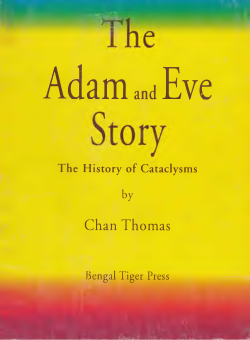he went through the courses in record time as a student, Master and Graduate at 25 to 30 years old.
On investigating, I found that travel was quite common between the Holy land and India in Jesus’ time. He could have made the trip there very easily at fifteen to twenty and back just as easily ten to fifteen years later.
We are also informed of Jesus’ proclivity for dropping into temples just to have intellectual and spiritual discourse with adult intelligentsia.
Imagine his going to India, happening onto the Nacaal Temple, dropping in for some discourse, and afterward deciding that there was the place for him to stay and really learn.
Spending ten to fifteen years learning to speak and write Naga, and speaking it as his sole language for that duration, certainly would account for his reverting to it on the cross as his natural language.
There is another point in question which has to do with doctrine taught at the Temple. The entire philosophy of religion as Jesus taught it was exactly as he had learned it at the Temple. Never would he have entertained the thought that God would or might forsake him, under any circumstances whatsoever, on or off of the cross, or anywhere. Only humans would.
39
At this point we should summarize everything we can about the events surrounding the moments when Jesus spoke those words on the cross, and apply whatever reasoning we can in order to cover every aspect involved toward either verifying or refuting our translation of his words.
First: Our only reasonable source of the words Jesus actually spoke is through Matthew and Mark.
Second: It is abundantly clear that Jesus spoke in a loud voice. There is a difference between listening to sounds and hearing them; Matthew and Mark listened to him to the extent that they were able to write down the phonetics of what Jesus said to the best of their ability. We should recognize that their attention to the details of the phonetics was enhanced by the loudness with which Jesus spoke. John didn’t pay much attention to detail; he just heard Jesus speak loudly, and assumed that Jesus said merely, “I thirst” without even attempting to listen to or write down the phonetics of the words Jesus spoke.
Third: Our only primary source of the meaning those words is through Matthew, Mark, and John. Matthew said, “That is to say,….”; Mark said, “….which is, being interpreted,….”; and John said, “Jesus said, I thirst.” It is clear that Matthew and Mark were not translating, but giving us their best guesses what the words Jesus spoke meant. John just guessed outright.
40
Pages: 1 2 3 4 5 6 7 8 9 10 11 12 13 14 15 16 17 18 19 20 21 22 23 24 25 26 27 28 29 30 31 32 33 34 35 36 37 38 39 40 41 42 43 44 45 46 47 48 49 50 51 52 53 54 55 56 57 58 59 60 61 62 63 64 65 66 67 68 69 70 71 72 73 74 75 76 77 78 79 80 81 82 83 84 85 86 87 88 89 90 91 92 93 94 95 96 97 98 99 100 101 102 103 104 105 106 107 108 109




